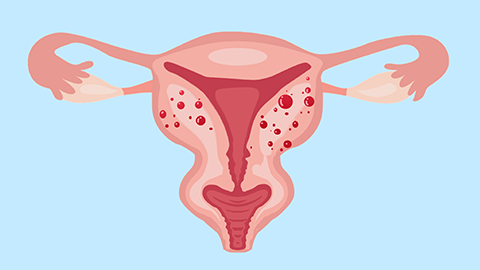How is endometriosis caused?
Generally, endometriosis may be caused by factors such as retrograde menstrual flow with implantation, genetic influences, chronic pelvic inflammatory disease, adenomyosis, polycystic ovary syndrome (PCOS), and others. It is recommended to seek timely medical consultation to identify the underlying cause, followed by appropriate interventions such as general management and medication under a doctor's guidance. A detailed analysis is as follows:

1. Retrograde Menstrual Flow with Implantation: During menstruation, endometrial cells may travel backward with the menstrual blood through the fallopian tubes into the pelvic cavity, where they can implant and grow, leading to endometriosis. To reduce the likelihood of retrograde flow, avoid strenuous exercise and prolonged sitting during menstruation. Wear loose and breathable clothing, maintain external genital hygiene, and avoid sexual intercourse during menstruation to reduce the risk of infection.
2. Genetic Influences: Endometriosis tends to cluster in families, and having family members with the condition increases one's own risk of developing it. Regular gynecological ultrasound examinations are recommended for early detection and intervention. Maintain a regular sleep schedule, avoid staying up late, engage in moderate physical activity, and enhance overall immunity.
3. Chronic Pelvic Inflammatory Disease: Long-term infection of the pelvic cavity by bacteria or chlamydia may lead to chronic inflammation. This inflammatory response alters the pelvic environment and promotes the implantation and growth of endometrial cells. Patients should follow medical advice to use anti-infective medications such as cefixime dispersible tablets, metronidazole tablets, and doxycycline hydrochloride tablets.
4. Adenomyosis: Endometrial tissue may invade the muscular layer of the uterus and may coexist with endometriosis, exacerbating ectopic lesions in the pelvic cavity. Patients should follow medical advice to use medications such as gestrinone capsules, norethisterone tablets, and dydrogesterone tablets to inhibit the growth of ectopic endometrial tissue.
5. Polycystic Ovary Syndrome (PCOS): Patients with PCOS often experience ovulatory dysfunction, elevated estrogen levels, and insufficient progesterone, which can stimulate excessive endometrial proliferation and increase the risk of endometrial displacement. Patients should follow medical advice to use hormonal-regulating medications such as ethinylestradiol cyproterone acetate tablets, drospirenone ethinylestradiol tablets, and desogestrel ethinylestradiol tablets.
In daily life, it is important to keep the body warm during menstruation and avoid exposure to cold. Diet-wise, consume more fresh vegetables and fruits, and reduce the intake of high-sugar and high-fat foods. Comprehensive nursing care can help manage the condition and support reproductive health.





